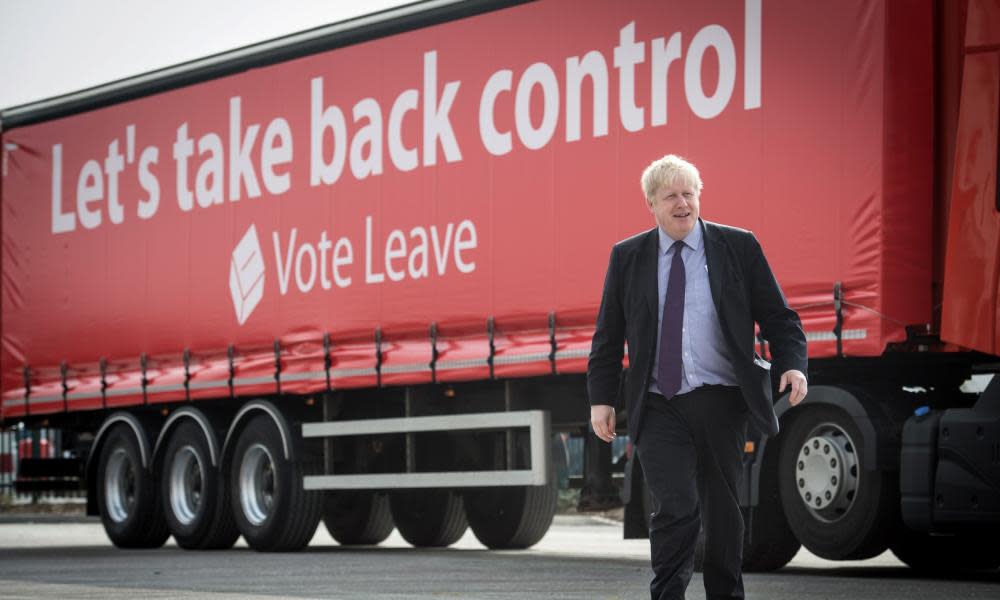PM does not have to investigate Russian interference, judge says

A judge has rejected an attempt by a group of MPs and peers to compel Boris Johnson to investigate Russian interference in UK elections, saying their concerns were a “matter for politics rather than the law”.
The judge, Mr Justice Swift, said he saw “no distinction” between a controversial talkshow host – or a “shock-jock”, as he put it – and career spies in Moscow seeking to disrupt British democracy. He turned down the cross-party group’s application for a judicial review.
The MPs said they would continue their claim, with a further hearing likely later this year in the court of appeal.
“This leaves our democracy defenceless against a hostile foreign power,” Labour’s Ben Bradshaw said. “There is a timidity on the part of the legal establishment to stand up to the executive.”
Bradshaw added: “The government has been wilfully negligent in investigating Kremlin interference in our democratic processes. Every other western democracy takes this extremely seriously. Boris Johnson is looking away.”
Labour MP Chris Bryant, a former Europe minister, called it an “extraordinary decision”.
The MPs filed a claim last October in the high court in an attempt to force the prime minister to carry out an investigation or a public inquiry into alleged Moscow meddling. It was the first legal action of its kind over apparent national security failures.
The move followed the publication last July of the Russia report by parliament’s intelligence and security committee (ISC). It found that the governments of Johnson and Theresa May had failed to investigate Kremlin meddling in the 2016 EU referendum vote – a “hot potato”, as the ISC put it.
The ISC urged Downing Street to carry out a full inquiry and to put in place a legislative framework to prevent future interference by foreign states. No 10 turned down the request. It argues there is no evidence of “successful” disruption by Vladimir Putin’s operatives.
The high court was told on Tuesday that the UK was a “top target” for Russian influence operations. There was “strong prima facie” evidence that Russia had interfered on the side of leave in the 2016 Brexit vote – and subsequently in the 2017 and 2019 general elections.
The Kremlin used two main tools. One was a troll-driven social media campaign to “disseminate disinformation”. The other was a hack and leak operation of the kind seen in 2016, when Russia raided Democratic party servers in order to help the then US presidential candidate Donald Trump, the court heard.
Five years on, government and the intelligence services had still not examined the “extent and reach” of the Russian EU referendum operation, it was said. This amounted to a breach of the government’s obligations under article 3 of protocol 1 of the European convention on human rights (ECHR), which guarantees free and fair elections.
The claimants were not seeking to overturn the referendum result, their barrister Richard Hermer QC stressed. Rather they wanted the government to see what lessons might be learned, and to take steps to prevent meddling in future, he said.
Swift said he could not envisage the European court passing legislation which would force the home secretary to look into the interference issue. He observed: “Tasking the security services in this way would be quite a bold decision, as they say on Yes Minister.”
The high court claim names Johnson as defendant. It is being backed by Peter Ricketts, the government’s first national security adviser between 2010-12 under David Cameron, and the former chair of the joint intelligence committee (JIC).
In his witness statement, Lord Ricketts said he was “very surprised” the government had not sought evidence over Russian interference in the Brexit vote, nor carried out “a post-referendum assessment of Russian attempts to influence elections in the UK”.
He added: “Given the importance of knowing the extent of past Russian interference in assessing the risk for future elections, I do not understand why the government would choose not to investigate.”
Six peers and MPs have joined the claim. They include Labour’s Bradshaw and Bryant, the Lib Dem Lord Strasburger, cross-bencher Lady Wheatcroft, the Green MP Caroline Lucas and Alyn Smith, the SNP’s foreign affairs spokesperson. All the Citizens, a non-profit organisation, is also involved.
Speaking outside court on Tuesday, Smith said the government had “sandbagged” the Russia report – by first delaying its publication, and then refusing to implement its findings. “The ISC was a wake-up call. The government is refusing to wake up,” he said.

 Yahoo Movies
Yahoo Movies 
